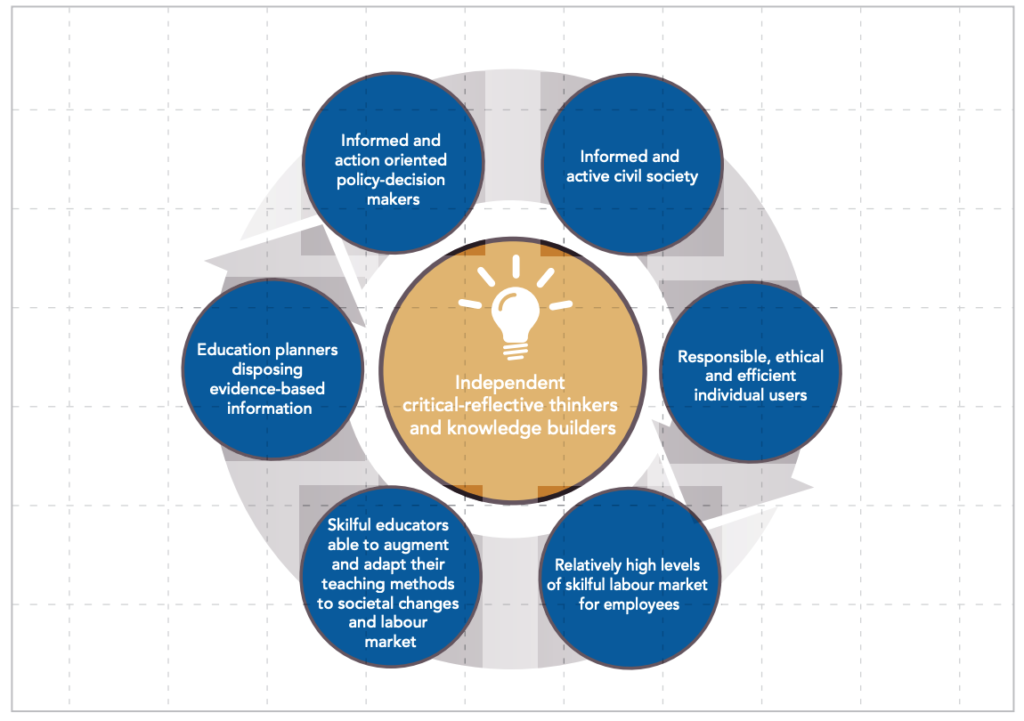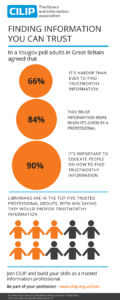New Voices RGU Student Series: Sarah Lantry
Category: New Voices
This blog is posted as part of our New Voices RGU Student Series, where we are publishing blogs written by Robert Gordon University Information and Library Studies Students as part of their coursework.
About the writer: Sarah Lantry is a full-time online distance student at Robert Gordon University studying MSc Information and Library Studies. She lives in Calgary, Canada, and works weekends at Okotoks Public Library. She loves art, architecture and exploring new places with her daughters. Sarah has two cats who keep her company while studying.
Public Libraries as Pillars of Democracy
“Democracy depends on an informed population. And where can people get all the information they need? — At the Library.” – Elliot Shelkrot, Head of the Free Library of Pennsylvania.
Democracy is under threat. Information is global and instantly accessible across many media platforms, both in terms of retrieval and contribution to the information sphere of the modern era. Yet the information needs of citizens are challenged by an abundance of misinformation, disinformation, bias and algorithms. The negative effects of this go against the core values of librarianship, and as a result librarians are joining forces globally to empower the public and protect democracy.
Misinformation and algorithms are attempting to influence election outcomes. Dr. Joel Riordan, University of Calgary, describes some of the methods used to influence citizens in his video ‘How do they change how you vote?’ This manipulation results in a growing distrust of media and politicians among citizens. The threat this poses to democracy has become a global concern as indicated by the theme for the upcoming World Forum on Democracy 2019.
The challenge is to reduce the negative impact and consequences of misinformation on democracy without infringing on freedom of speech and expression of thought. Citizens need to exercise critical awareness and be information literate, and they need to get out and vote.
“Information literacy is the ability to think critically and make balanced judgements about any information we find and use. It empowers us as citizens to reach and express informed views and to engage fully with society.” – CILIP Definition of Information Literacy, 2018

The importance of media and information literacy and its direct impact on society, as researched by The United Nations Educational, Scientific and Cultural Organisation (UNESCO 2013).
UNESCO developed policy and strategy guidelines (2013), in which media literacy is described as a compound concept, with mass education of citizens globally as the solution to misinformation. Teachers are the front line in empowering future generations with media and information literacy. However, the majority of the voting public have never received the benefit of instruction in information and media literacy.
The American Library Association (ALA) launched Media Literacy @ Your Library (2018), a project which trains library staff to empower adults with information and literacy skills programming. Training the librarians only took a day and the programmes they offered were a success. The project identified four challenges for libraries;
- Awareness: Some adults consider themselves to be more media literate than they are in reality.
- Outreach: Approaches to programming may need to vary for different demographics of the adult population.
- Funding: Budget is always a challenge for public libraries.
- Political neutrality: Careful attention needs to be given to a balance of perspectives to keep the library neutral
Trust
According to European Policies Initiative (EuPI) of the Open Society Institute report on Resilience to ‘post-truth’ and its predictors in the New Media Literacy Index 2018 (Lessenski, 2018), trust is one of the predictors used in measuring resiliency to misinformation.
Trust is an important value for a population who have been misinformed and manipulated through the media.
The figure to the right is a librarians as trusted professionals infographic, based on results of YouGov poll of 2000 adults in Great Britain. (CILIP, 2018)
Librarians are generally considered trustworthy and this, combined with their professional values, non-partisan positions, and accessibility for all make public librarians the ideal enablers of citizens in media and information literacy. There’s nothing librarians like more than empowering the public with resiliency skills, after all.
References
AMERICAN LIBRARY ASSOCIATION COUNCIL, 2019. Core Values of Librarianship. [online]. Chicago, IL: American Library Association. Available from: http://www.ala.org/advocacy/intfreedom/corevalues [Accessed 17 October 2019].
AMERICAN LIBRARY ASSOCIATION, 2018. Media Literacy at Your Library Learning and Prototyping Report. [online]. Chicago, IL: American Library Association. Available from: http://www.ala.org/tools/sites/ala.org.tools/files/content/Media%20Literacy%20%40%20your%20library%20-%20Final%20Report%20Dec%202018.pdf [Accessed 17 October 2019].
CHARTERED INSTITUTE OF LIBRARY AND INFORMATION PROFESSIONALS, 2018. What is Information Literacy?. [online]. London, UK: CILIP. Available from: https://www.cilip.org.uk/news/news.asp?id=421972&hhSearchTerms=%22information+and+literacy%22 [Accessed 17 October 2019].
CHARTERED INSTITUTE OF LIBRARY AND INFORMATION PROFESSIONALS, 2018. Finding Information You Can Trust. [online]. London, UK: CILIP. Available from: https://cdn.ymaws.com/www.cilip.org.uk/resource/resmgr/CILIP/Advocacy/Trusted_Professionals/Finding_information_you_can_.png [Accessed 17 October 2019].
COUNCIL OF EUROPE, 2019. About the World Forum for Democracy 2019. [online]. Strasbourg, France: Council of Europe. Available from: https://www.coe.int/en/web/world-forum-democracy/about-the-forum-2019 [Accessed 19 October 2019]
GRIZZLE, A., et al., 2013. Media and Information Literacy: policy and strategy guidelines. Paris, France: UNESCO.
LESSENSKI, M., 2018. Common Sense Wanted Resilience to ‘Post-Truth’ and its Predictors in the New Media Literacy Index 2018. Sofia, Bulgaria: Open Society Institute.
PUBLIC LIBRARIES ONLINE, 2016. Political Ethics: Keeping Your Library Neutral. [online]. Chicago. IL: Public Library Association. Available from: http://publiclibrariesonline.org/2016/10/political-ethics-keeping-your-library-neutral/ [Accessed 19 October 2019].
UNESCO COMMUNICATION AND INFORMATION SECTOR, 2013. Global Media and Information Literacy Assessment Framework: country readiness and competencies. Paris, France: UNESCO.
UNIVERSITY OF CALGARY, 2019. How do they change how you vote?. [online video]. 26 June. Available from: https://explore.ucalgary.ca/how-do-they-change-how-you-vote [Accessed 17 October 2019].
Bibliography
EUROPEAN COMMISSION, DIRECTORATE-GENERAL FOR COMMUNICATION NETWORKS, CONTENT AND TECHNOLOGY, 2018. A multi-dimensional approach to disinformation. Luxembourg, Belgium: Publications Office of the European Union.
GOVERNMENT OF CANADA, 2019. Protecting Democracy. [online]. Ottawa, Canada: Government of Canada. Available from: https://www.canada.ca/en/democratic-institutions/services/protecting-democracy.html [Accessed 19 October 2019].
INTERNATIONAL FEDERATION OF LIBRARY ASSOCIATIONS, 2019. The Human and the Algorithm: Response to Council of Europe’s Draft Recommendation on Human Right Impacts of Algorithmic Systems. [online]. Den Haag, NL: IFLA. Available from: https://www.ifla.org/node/92559 [Accessed 19 October 2019].
Zimmer, B., 2018. Democracy under Threat: Risks and Solutions in the Era of Misinformation and Data Monopoly. Ottawa, Canada: House of Commons.
**The views expressed in our guest blogs are the writer’s and do not necessarily reflect the views of CILIPS**
